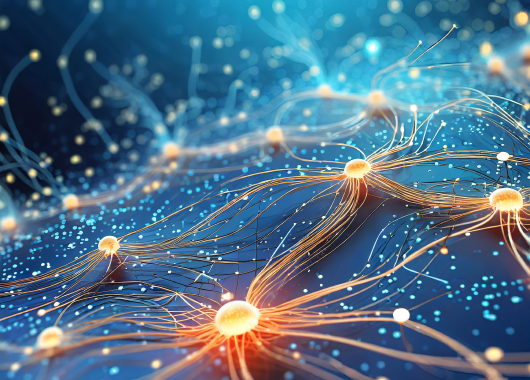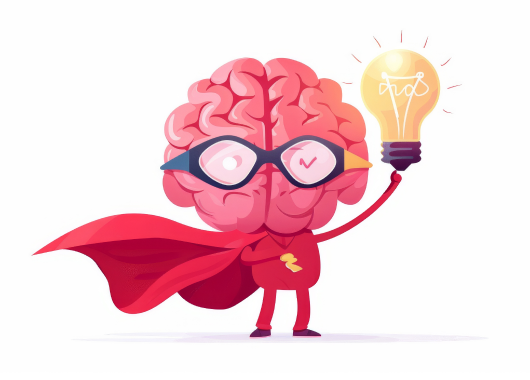IQ and Brain Plasticity: How Neural Connections Influence Intelligence

Introduction
Intelligence is one of the most fascinating aspects of the human mind. It determines
how we solve problems, adapt to new challenges, and learn throughout life. While many
people think of IQ as a fixed number that represents their intelligence, the reality is far
more dynamic. Recent advances in neuroscience reveal that our brains are constantly
changing and adapting - a process known as neuroplasticity. This means that our
intelligence isn't set in stone but can be shaped by experiences, learning, and lifestyle
choices. Let's dive into how brain plasticity and neural connections play a crucial role in
influencing IQ and cognitive abilities.
What Is Brain Plasticity?
Brain plasticity, or neuroplasticity, refers to the brain's incredible ability to reorganize
itself by forming new neural connections throughout life. Contrary to the old belief that
the brain becomes rigid after childhood, research now shows that our brains remain
flexible and adaptable well into adulthood. This adaptability allows us to learn new skills,
recover from injuries, and even enhance our intelligence.
When you learn something new, such as a language or a musical instrument, your
brain's structure changes. It strengthens the connections between neurons, making it
easier to process and recall information. These changes can lead to improvements in
IQ, demonstrating that intelligence is not as fixed as once thought.
How Neural Connections Affect IQ
The human brain consists of billions of neurons (nerve cells) that communicate with
each other through synapses. These synapses act as bridges, allowing electrical
signals to travel between neurons, carrying information across different parts of the
brain. The efficiency and strength of these connections significantly impact cognitive
abilities and IQ.
- Stronger Connections: When you repeatedly practice a skill, the connections between neurons strengthen, making it easier to perform that task. This is why musicians, athletes, and mathematicians become more proficient with consistent practice. Their neural pathways become more efficient, leading to higher cognitive performance.
- Weaker Connections: On the other hand, skills or knowledge that aren't used often can fade over time, leading to weaker neural connections. This explains why we sometimes forget things or become rusty in skills we haven't practiced in a while.
The Role of Myelination in Intelligence
One of the key factors that influence how quickly and efficiently neural signals travel is a substance called myelin. Myelin is a fatty coating that wraps around nerve fibers, acting like insulation on electrical wires. The thicker the myelin sheath, the faster and more efficiently information is transmitted between neurons.
People with higher IQs often have more myelinated neural pathways, enabling them to process information faster and more accurately. Fortunately, myelination isn't fixed; it can increase through activities that challenge the brain, such as learning new skills, solving puzzles, or engaging in mentally stimulating conversations.
How Brain Plasticity Enhances Learning and IQ
Neuroplasticity makes it possible for the brain to change and adapt, but how exactly does it boost IQ? Here are a few ways brain plasticity enhances intelligence:
- Creating New Neural Pathways: When you encounter new information, your brain forms new connections between neurons. The more you practice or engage with the material, the stronger these connections become, making it easier to recall and apply what you've learned. This process contributes to improved problem-solving skills and adaptability, which are key components of IQ.
- Strengthening Existing Connections: As you continue to practice a skill or learn new information, existing connections become more robust. This reinforcement leads to quicker processing speeds, better memory retention, and an overall increase in cognitive abilities.
- Eliminating Inefficient Connections: The brain is also capable of "pruning" or eliminating neural connections that are no longer needed. This process helps the brain function more efficiently by focusing resources on the most important and frequently used pathways. This optimization contributes to enhanced intelligence and a sharper mind.
 Practical Ways to Boost Brain Plasticity and IQ
Practical Ways to Boost Brain Plasticity and IQThe exciting thing about neuroplasticity is that you can actively work to enhance it, thereby improving your IQ and cognitive abilities. Here are some practical strategies to stimulate brain plasticity:
- Learn New Skills: Engaging in activities that challenge your brain, such as learning a new language, playing a musical instrument, or picking up a new hobby, encourages the formation of new neural connections.
- Stay Physically Active: Regular exercise increases blood flow to the brain, promoting the growth of new neurons and enhancing brain plasticity. Activities like running, dancing, or even brisk walking can boost cognitive function and improve intelligence over time.
- Practice Mindfulness and Meditation: Mindfulness practices help increase gray matter density in the brain, which is linked to improved memory, attention, and problem-solving skills. Engaging in regular meditation can strengthen neural pathways and enhance cognitive abilities.
- Challenge Your Mind: Engage in puzzles, brain games, or activities that require strategic thinking. These activities keep the brain active and encourage the formation of new neural pathways, which can boost IQ.
- Get Enough Sleep: Sleep is essential for brain health and plasticity. During sleep, the brain consolidates memories, strengthens neural connections, and removes toxins that build up throughout the day. Ensuring you get quality sleep helps your brain function at its best, improving your ability to learn and recall information.
- Healthy Diet: Consuming a diet rich in omega-3 fatty acids, antioxidants, and vitamins supports brain health. Foods like fatty fish, nuts, berries, and leafy greens promote the growth and maintenance of neural connections.
The Connection Between Emotional Intelligence (EQ) and IQ
While we often focus on IQ as a measure of intelligence, Emotional Intelligence (EQ) also plays a crucial role in overall cognitive abilities. EQ is the ability to understand, manage, and use emotions effectively, which is closely tied to brain plasticity. Individuals with high EQ can adapt to social situations, manage stress, and handle challenges more effectively, which, in turn, enhances cognitive function.
Interestingly, activities that boost brain plasticity, such as mindfulness, learning new skills, and staying physically active, can also improve emotional intelligence. This highlights the interconnected nature of different forms of intelligence and how they all contribute to overall cognitive performance.
Intelligence is not a fixed trait but a dynamic and adaptable quality shaped by our experiences, habits, and environment. Through the incredible process of neuroplasticity, our brains are constantly forming, strengthening, and optimizing neural connections, making it possible to enhance our IQ over time.
By engaging in activities that challenge the mind, staying physically active, and nurturing our emotional intelligence, we can take full advantage of our brain's plasticity. The journey to a sharper, more intelligent mind is a lifelong adventure-one that's within reach for everyone willing to embrace the brain's remarkable ability to change and grow.
Embrace the power of neuroplasticity, and you'll not only improve your IQ but also unlock your potential for learning, creativity, and adaptability in every aspect of life.
